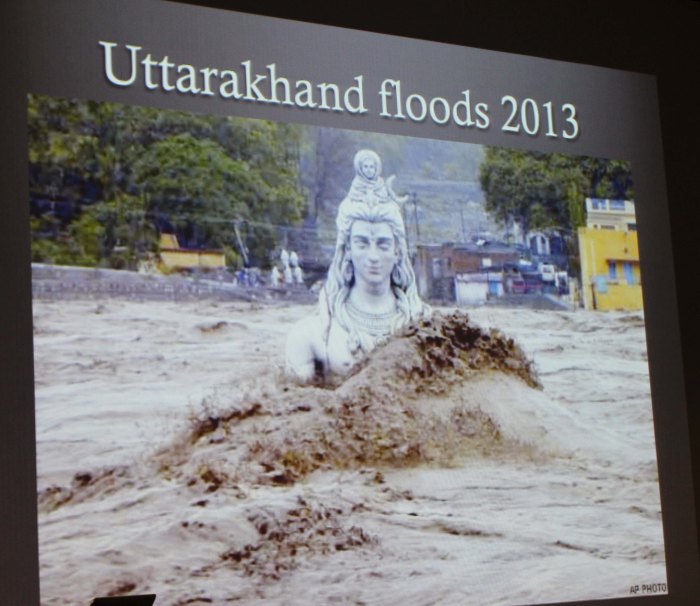
What cultural and religious frameworks do Indian Hindus draw on when making sense of chaotic and unusual weather patterns brought on by global climate change? While South Asia’s rural inhabitants perceive radical changes in weather patterns that affect their daily lives and livelihood, their perceptions about the underlying reasons vary. Few frame the developments in terms of climate change as a global phenomenon; instead, chaotic climate events are often attributed to either divine retribution or human moral corruption.
These diverse, even conflicting ways of articulating the role of the human and the divine in destructive climatic patterns invite the questions: How do religious agents in Hindu India understand human moral responsibility, particularly the role of human morality and goodness, in shaping both long-term and short-term climactic and environmental patterns? What kinds of perceptions about the impact of morality on ecology and climate do we find in traditional Hindu sources, and how do contemporary Hindus draw on similar conceptions in making sense of contemporary global climate change? Perhaps most important are the potential implications of these questions: if human individual moral laxity plays a role in aggravating detrimental climate change, could it then be that, conversely, human moral excellence and virtue might have the power to mitigate such climate change?
While scholars of religion have studied the interface between religion and ecology since the early 1970s, the specific question of religious responses to global climate change has until now received little attention. This is at least partially because climate change has emerged as a subject of global, widespread discussion only in the last decade. Climate scientists are now nearly unanimous in warning about the potentially catastrophic consequences of unchecked global warming. A changing global climate has already begun to affect human societies, making them increasingly vulnerable to disasters, crop failures, and forced migration.
In confronting the questions of safety, sustenance, livelihood, consumption, and environmental justice resulting from this situation, communities worldwide also inevitably end up having to engage questions of moral, spiritual, and religious tenor as well. Some have even suggested that the world’s religious traditions have unique potential to motivate concern and activism to address the problem of climate change. After all, religion remains a powerful force and motivator in the lives of most people in the world, influencing believers’ worldviews, values, and relationship to the natural world. Because of this strong resonance, religious leaders are able to engage large audiences and mobilize them unlike few other actors. Religious narratives also provide people with a sense of meaning, and present a natural context for ethical deliberation (Veldman, Szasz, Haluza-DeLay 2013; Sponsel 2005).
The situation is particularly urgent in India, home to over a billion people, where the effects of climate change are affecting the most vulnerable part of the population: India’s rural poor. Similarly, the moral and spiritual resonance of environmental issues is particularly rich there, as Indian Hindu religious stories, myths, and practices have always been interwoven with natural phenomena and the very shapes of the landscape.
My research project centers on investigating what I, following Ann Gold (2002) and Frédérique Apffel-Marglin (2000), call the “moral ecology” of contemporary Hindu India – namely, the ways in which religious agents perceive a connection between the human moral condition and the condition of the environment. Unlike Gold and Marglin, however, I consider this question specifically in relation to the phenomenon of climate change. The primary questions driving this research are: What cultural and religious frameworks do Indian Hindus draw on when making sense of chaotic and unusual weather patterns brought on by global climate change? To what degree do they view environmental degradation as being due to human choices and actions—as opposed to, say, divine agency or fate? What moral and spiritual resources does the Hindu tradition offer in the face of the unprecedented challenges posed by a warmer and less predictable world?
My research for this project has involved carrying out interviews (in Hindi and in English) with farmers, educators, and environmental activists in the three states of Uttarakhand, Rajasthan, and Andhra Pradesh. My preliminary findings suggest that while India’s rural inhabitants perceive radical changes in weather patterns that affect their daily lives and livelihood, their perceptions about the underlying reasons vary. Few frame the developments in terms of climate change or rising CO2 levels; instead, they tend to attribute chaotic climate events to either divine retribution or human moral corruption. However, a great deal more work is needed for me to fully explore these complex questions.
Mari Jyväsjärvi Stuart is Assistant Professor, Religious Studies, University of South Carolina and a scholar with Virtue, Happiness, & the Meaning of Life.